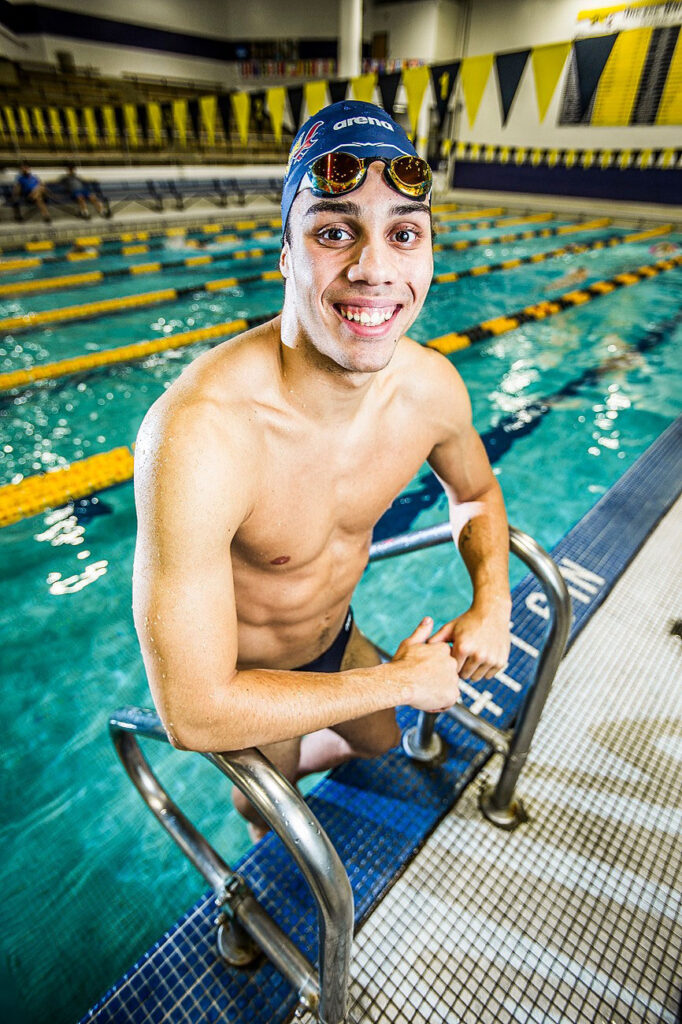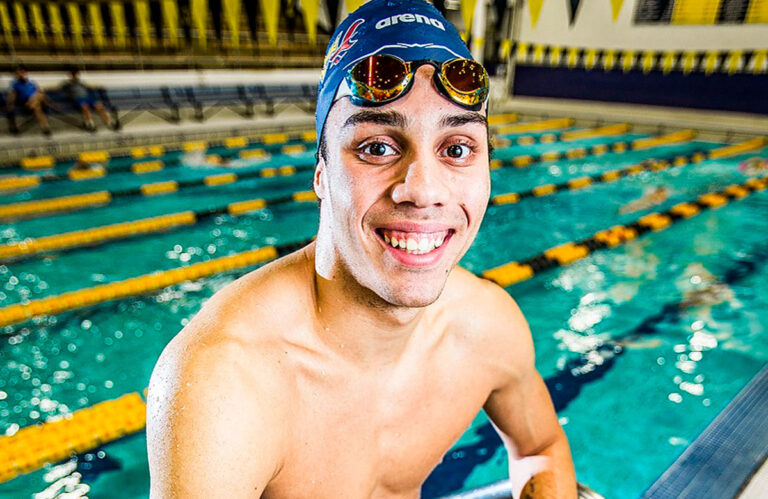
The pool Sebastian Smith dove into at the U.S. Olympic Trials in June 2024 at Lucas Oil Stadium in Indianapolis couldn’t have been more different than the water in which, as a kid, he developed his passion for swimming.
Smith grew up near Poughkeepsie, New York, racing in not just perfectly clear, chlorinated pools, but also in murky, muddy lakes. He shared his lanes with fish and frogs. While swimming backstroke, he often was blinded by the sun. He loved it.
“There’s a lot of differences,” he says of the venues. “One is you don’t know where exactly you’re going. You can’t see the bottom. But it helped keep it fun, if that makes sense. Even with my parents, there was never any real pressure to keep swimming. They knew I was good at it, so they wanted to keep me in it. I think just having fun was the most valuable part.”
That outlook has paid off for the third-year, who as a first-year was named CAA Rookie of the Year, and last summer swam with the best America has to offer at the Olympic Trials. He came up short, but there’s no doubt that both in the pool and out, his future is bright.
“Seb sets extremely high floors for himself and then holds himself very accountable to them,” says Nathan Lavery, Drexel’s head swimming and diving coach. “It’s not as much about the peak that he aims at as it is his ability to never have a bad day, or at least mitigate those days. He does this in a lot of ways and is proactive and disciplined about it.”
Smith was always a fast swimmer, but it wasn’t until high school that he developed into a supremely talented one. During the COVID-19 shutdown, he had not much else to do other than lift weights and swim. He added 40 pounds to his frame and suddenly started attracting some attention from colleges.
“Seb is tall, lean and has a natural ability to maintain a high intensity for a longer period of time,” Lavery says. “For swimming specifically, he can easily break down specific areas he wants to focus on, measure them correctly, and then try things to see if those measurements change. Beyond his physical attributes, it’s really that awareness and ability to change how he’s applying those physical attributes that drives his success.”
He chose Drexel in part for its swim team, but also for its academics.
“I felt that this was a place of progress and a place to grow,” says the exercise science major, who last year was named to the CAA Commissioner’s Academic High Honor Roll. “And in my years that I’ve been here, I’ve seen nothing but progress and success within myself in the Exercise Science program and the swim program.”
Smith’s personal discipline offers a clue as to how he’s excelled. He typically goes to bed around 8:30 p.m. — not exactly standard for a college kid — before waking up around 5:30 a.m. After two Rice Krispies treats for breakfast, he hits the weight room at 6:00 a.m., then swims for 90 minutes. After classes and a carb- and protein-filled lunch, he’s back in the pool for afternoon swim practice.
“The more that’s on my plate, the better I thrive,” he says. “There are less distractions. I only have a certain window to get things done. I always pride myself on being early. I know what it takes. And the reason I am where I am is because of the decisions that I’ve made.”
The crowning achievement in his career thus far is qualifying for the Olympic Trials in the 100 fly and the 50 freestyle.
The competition was held in front of record crowds in the domed stadium where the NFL’s Colts play. It was a pinch-me-is-this-even-real moment, but when the competition started Smith’s instincts took over. He was pleased with his efforts despite not qualifying for the Paris games.
“There’s a lot to take in at a meet like that, and for me, it was a learning experience,” he says. “Obviously, I want to go out there and do well, but I think being able to take away that I did things correctly, I can go to any other meet and it’s not going to be at as high of a level as the Olympic Trials were.”
He has his heart set on qualifying for the 2028 Olympics in Los Angeles, but he also knows that other goals await. He’s keeping them to himself right now, but suffice it to say, one of them is to have fun in the water.
“I know it sounds cheesy, but I’ve had a couple of people on the team come up to me after they’ve won a medal and they have said, ‘I wouldn’t have done this time, and I wouldn’t have been where I am today if it wasn’t for your mindset, your attitude,’” he says. “That means so much more to me than winning Rookie of the Year or breaking a record because that means I made an impact. Records are going to get broken at some point but changing that person’s life or their athletic career means more to me.”


